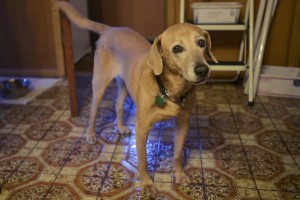problem-solving
Smart thermostats anywhere
By Sam Wolfe, Guest Blogger
According to the recently published news story, “Smart thermostats remember for you,” a thermostat that is “just about as smart but doesn’t connect to the Internet” was installed in the back side of this home. (We live in northwestern Denton.)
Only one wire was available to power the thermostat. According to HVAC technician Bill Clark, the thermostat pictured in this story needs two wires to operate, a hot wire and a common wire, as do all other smart thermostats you can buy.
Research shows that the common wire is not available in some applications with a non-heat pump system. This requires battery power to a digital thermostat. Only a conventional thermostat or a programmable thermostat (one that is “just about as smart but doesn’t connect to the Internet”) could be used in these applications … until now.
With a Venstar Add-a-Wire accessory box and diode, you can simply “turn one wire into two.” For more information about this accessory, follow this link:
Note from Peggy: Sam was terribly disappointed after we were able to install an internet-ready thermostat in my house, but not his apartment. (For want of that wire. I wasn’t going to pay to lay more wire in the attic.) He went in search of a solution to that problem and found the add-a-wire device. After I asked him to make sure it was UL-listed, he ordered it, and then installed both the add-a-wire and the internet-ready thermostat in his apartment (which is in the back of the house) himself. He took the photos of his handiwork so you can see what he did.
Overheard in the Wolfe House #298
Peggy: Rules for writing a resume aren’t black and white.
Sam: So, not like 1960s television.
Overheard in the Wolfe House #297
Sam (after playing “good cop”): Mom, you were really pushy this morning.
Peggy (after playing “bad cop”): Yes, I was.
Sam (face in hands): I’m not sure it was the right thing.
What we do for air conditioning
I doubt my late husband could have convinced me to move from California back to Texas without the miracle of air conditioning. I still marvel at how I lasted the first months of my freshman year at North Texas State University, moving from central Wisconsin into an un-air conditioned room on the fourth floor of Bruce Hall.
(There were showers full-on cold every morning and night, swimming in the pool that used to be across from Willis Library, and everything iced. And more showers. Go, Mean Green.)
I try not to think about those beautiful California delta breezes at 4 o’clock in the afternoon in August in Texas. In Sacramento, the winds shifted just as the summer afternoon got hot. Those delta breezes pulled in air cooled by the Pacific Ocean.
Summer outstays its welcome here in Texas, the way winter does in Wisconsin. Air conditioning makes it bearable.

So does splaying out on the kitchen floor tile, as my dog, Gus, would tell you if he could. Photo by David Minton
Gus doesn’t like the air conditioner in our new house one bit. On move-in day April 1 and for a day or so after, he wouldn’t go down the hall towards any of the bedrooms. I didn’t figure out why, and it passed. Only later did I understand that it passed because I turned off the air conditioner until June.
We had an unusually cool, wet spring. I wanted the peace and quiet. My house was built in 1961. Air conditioning for this house, like many homes of this era, came later. That means the system equipment that would be in the attic of a newer home was installed in our hall closet.
It’s loud.
Really loud.
After I turned the air conditioner on for the summer, Gus preferred to stay in the living and kitchen areas. When pressed, he would come into the first bedroom, which is my office, and hid under the desk while I worked.
Gus is an old guy. Come November, he’ll be 14, which makes him about 78 in dog years. After we sold the farm and moved to town, it was fun to watch him recognize that his patrol duties had shrunk to a city lot down from 10 acres (with the additional security risk of a creek running through part of it).
You could almost see it in his eyes. “Hey! This is great! I can retire!”
We have a new routine that includes lots of fake patrols through the drainage ditch behind the house. Instead of napping under the porch, he naps in the garage.
At night, he’d whimper and cry when I headed for bed, which soon became crying whenever I went down the hall. Still, it took me a few days to figure out it was the air conditioner that was bothering him. At first, to help him out, I carried him down the hall, past the unit, at bedtime. But then, he started getting anxious as I would get ready for bed. Clearly, he didn’t even want to be carried down the hall. I looked again and saw that there are intake vents both in the hall and in the master bedroom.
I gave up.
I set up the laptop in the kitchen. I hardly use the big Mac the way I used to for writing and research. I moved the sewing machine to the dining room. And every night since June, I throw the big decorator pillows on the floor for Gus, and I sleep on the sofa.
When Sam went to kindergarten at Argyle Elementary School, he was terrified of the school bells. The teachers worked it out that Sam would always be outside for a fire drill before the alarm went off. But the 9 a.m. attendance bell was becoming a problem. The kindergarten teacher told Principal Gaye Pittman that Sam would watch the clock earlier and earlier each day. He was developing an increasingly elaborate routine to try and anticipate the moment the bell would sound.
Gaye knew just what to do. She turned the bells off. Teachers would just have to remember to take attendance at 9 o’clock without a bell.
It’s August, Gus. It’s Texas.
We’re not turning it off.
Outward Bound, the indoor edition
“Because you know, nothing bad ever happens to a writer; everything is material.” – Garrison Keillor quoting Philip Roth.
I learned about stage fright at age 10. I had been taking piano lessons for a year. My memories of that first spring recital are a little foggy, except, just before I sat down to play, I saw my dad slip in the door of the recital hall (someone wheeled a spinet piano into the school cafeteria). And I played my song without stopping.
That’s a victory when you are 10 years old.
After the recital was over, I went home with my dad. I tried to eat dinner, but instead I vomited and went to bed.
I loved playing the piano, though, so I kept up with my lessons. I didn’t play again in public for about five years. When it was time, my new piano teacher was clever. (I didn’t tell Mr. Kaehr about my stage fright. But he apparently knew and he knew how to prepare me.) He had me work up Ernesto Lecuona’s Malaguena – so fun and flashy – to play during the honor society banquet. When I was done, the crowd’s reaction told me that they didn’t expect what they’d just heard. That was incredibly affirming, enough for me to perform, and recover from performing, vomit-free, for several years.
When I headed to college, I majored in music. I could get through the performance of a single solo on a departmental recital all right, but putting together an entire solo recital was another matter. I could channel that adrenaline for 10 minutes, but not an hour or more. After one recital I couldn’t even make it through the reception afterward. Went home, vomited and slept all weekend.
I’ve never thought of myself as a risk-taker, especially compared to my late husband. To Mark’s credit, however, he thought through things. In his mind, he wasn’t taking risks. He was fearless in persevering and adapting. I tried not to be afraid of opportunities, or leaning in when problems showed up.
For example, we recognized we couldn’t get help for Sam if we were shrinking violets. We spoke up, we stood fast, we made plain that we expected delivery of the help he needed. Neither of us would take credit for what Sam has accomplished. However, we would have admitted to sweet-talking, cajoling, persuading, wheedling, and outright pushing the people around him when and where necessary. (And, I’m sure, where others in his life might have said wasn’t necessary.) I learned to channel that swirling adrenaline for the length of special education team meetings.
After Mark died, there was no hedging. All bets were off.
Still, I didn’t recognize being in small claims court this week as an indoor edition of Outward Bound until it was over.
A friend, who’s a lawyer, told me that what I’d just done many lawyers in town have not done: argue my case in front of a jury.
When the jury was out, I did confess to the bailiff that the experience was terrifying.
Sad to say, in the Texas justice system, there apparently is nothing in between refusing an insurance company’s first offer to settle your case and finding yourself in front of a jury — unless you just want to up and say ‘never mind.’
My insurance company investigated and determined I wasn’t liable. But the truck is so old, I only carry liability. I was on my own with the other guy’s insurance. And, as Mark would say, “just to make this really interesting,” this company has a poor reputation with many people.
Including me. I’d gone to the mattresses once before with this company.
I refused their first offer, which was totally inadequate. They never budged. When I sued in small claims, I expected mediation or arbitration. I hoped for another offer.
Nope. Nothing. Nada.
Their response to my petition was to ask for a jury trial. I think I was supposed to run from the room at some point, but that just never occurred to me.
I was sticking up for myself and my family.
I lost the argument before I could ever start. The insurance company’s attorney called for a pre-trial conference with the judge to make sure I couldn’t tell the jury much of anything at all.
I felt bad for those people. What a waste of their time. They had no idea.
The whole ordeal lasted two hours. It was a terrific education into the Texas justice system that I won’t soon forget.
And, when I finally got home that day, I didn’t vomit.
Overheard in the Wolfe House #289
Peggy: Coding has to be perfect … (pauses) … because computers are stupid.
Sam: It has to be perfect because otherwise it’s only in your imagination.
Chisholm Challenge 2015: Equitation
Dunny was having a bad day on the first day of Chisholm Challenge, as were a number of other horses for some reason. The good folks at Born 2 Be decided it wouldn’t be safe for Sam or any of the other riders to ride Dunny that day. So, at the last minute, they saddled up another horse that Sam had not rode for years.
We were all proud of them for that catch ride, doing their best under pressure, even when they cantered right by the judge. Twice. See for yourself.
Other deadly encounters: police and people with autism
When Sam was 14, he enjoyed hopping on his bike and pedaling around the neighborhood. We knew he didn’t go far, maybe a mile or so, and back then our country road was quiet. We appreciated that he had found his way to explore the world. We thought that was important for his growth and development, so we tried to keep our worries in check.
He went out on his own one day when Mark and I had gone somewhere on an errand. When we returned, we were surprised to see a police car parked in front of our garage. In no time, Mark was in between the officer and Sam, who was pacing in the back of the garage, talking to himself, as the officer stood in the doorway trying to question him.
My heart was pounding. I could only stand there and watch. The officer left shortly after we arrived, but I knew Sam was in trouble.
It took some time to piece the story together.
Sam had pedaled down a new street, where a handful of large new houses were being built. He saw that many of the windows had been broken in one of the houses under construction at the end of the cul-de-sac. He got off his bike and walked up to take a closer look just as the officer was making his rounds. Sam scrambled back on his bike and rode home as fast as he could, with the officer chasing him in his car.
According to the officer, Sam was repeating the phrase, “Yep, it looks like I did it,” as he was pacing in the garage.
The officer wanted Sam to submit to a footprint, but we refused. The officer already had him at the scene. Our further cooperation wasn’t going to help Sam. We knew it was out of character for Sam to throw rocks at windows, but we couldn’t be completely sure. And we knew, too, that most every parent has probably insisted to police that their child “would never do that,” when, in fact, they had done whatever it was they were in trouble for.
As communities all around the nation, from New York City to Ferguson to Los Angeles, demand more from their relationships with their local police, I can’t help but think that in another city or another time, the outcome of that chase would have been totally different for Sam.
I was grateful that our local police didn’t overreact, but I couldn’t leave the situation as it was.
About five years before that drama in the driveway, just after we moved to Texas, I was horrified to read about Michael Clement, a teen with autism who had been killed by Plano police. His parents traveled to Michigan for their older daughter’s college graduation and hired a caregiver to take him from school to home. When the caregiver took him to a group home where she worked instead, Michael got upset. The staff at the home lost control of the situation and called police, who were even less prepared to deal with an upset young man with autism. According to court records, the officers were in the house just 19 seconds before killing Michael, who was suspected to have been holding a knife when he came out of the kitchen.
After I read the story, I shared it with a good friend, the late Don Louis, who worked as a grant writer and project developer at the University of North Texas in what was then the School of Community Service. Don convened a group of experts, and facilitated several fact-gathering conversations that included Michael’s parents, Pauline and Warren Clement, eventually developing a training module for police.
It was well received, including being approved by the state for the official police training curriculum, although for their continuing education.
I asked Don to get me a copy of the training manual to take to the police chief. I called my good friend, Judy Martin, who had a son with autism, too, and we asked for a meeting with him. Judy and I reminded the chief that our boys were just the first of a wave of youngsters with autism that would soon be teenagers and likely to have encounters with police as they aged. I was happy that the chief came prepared for our meeting and was receptive to the materials.
I knew that wasn’t necessarily the end of Sam’s trouble, with an open investigation into that vandalism and him at the scene, but I was glad we made the overture.
About a month later, I happened to be sitting in a town council meeting when the chief updated the council on the department’s activities. It turned out a group of boys from another nearby neighborhood had been caught vandalizing and they confessed to breaking the windows of the home where Sam had been.
As he made the announcement, he looked over his shoulder and gave me a knowing glance. That night, I told Mark and Sam that he was finally in the clear.
The situation traumatized him, though. We made a concerted effort for him to trust police again. It helped that the officer who had chased him down the driveway was often on school grounds and he reached out and talked to Sam.
But he still gets nervous when he sees an officer. And he never rode bike again.
Eleemosynary: the Telephone Book Lullaby revisited
The Denton Record-Chronicle‘s former opinion page editor, Mike Trimble, called big vocabulary $50 words. He knew a lot of them and used them to finish the New York Times crossword puzzle. Occasionally, he dropped one in his Mark Twain-like editorials, which sent you running to the dictionary. But we reporters are not allowed to use them in news stories, so my vocabulary muscles get flabby sometimes.
Five years ago, I stumbled on a $50 word that inspired understanding of an important concept for me as the parent of someone with autism. You can read some random thoughts about neoteny here.
Today’s $50 word, eleemosynary, means charity or alms giving. It’s also the title of a 1985 play by Lee Blessing, who is best known for A Walk in the Woods. Eleemosynary is filled with $50 words because the story involves a precocious teenage girl and her obsession with winning a spelling bee.
I learned the word today because of The Telephone Book Lullaby. I blogged about this little tune, written by Alec Wilder, about two years ago. It befuddled me how many times people landed on that page after a specific search for the lullaby. I thought I was writing about something pretty obscure. I suppose the lullaby still is obscure, since my blog post comes up so high in internet searches for it.
Occasionally, a reader has sent an email asking how to find the music to the lullaby. (Yes, Internet people, you can borrow a book of sheet music through interlibrary loan, just like any other kind of book). When I received yet another request recently, I asked why.
The woman told me that she was putting on the play and the playwright called for lullabies during the transitions between each act. Blessing calls for The Telephone Book Lullaby in one of the transitions.
The play appears to be enjoying a bit of a revival, based on how many recent productions showed up in a news search I did today. That suggests why people are looking for this obscure piece of music. As far as I know, it’s only available in an out-of-print children’s book.
I added a little piano recording to the original post to help out.
It’s nice to solve that little mystery, but it has lead to another one: How did Blessing know Alec Wilder and The Telephone Book Lullaby and why did he call for it?






